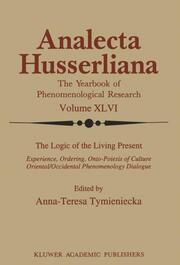Detailansicht
The Logic of the Living Present
Experience, Ordering, Onto-Poiesis of Culture, Analecta Husserliana 46
ISBN/EAN: 9789401042079
Umbreit-Nr.: 4375147
Sprache:
Englisch
Umfang: ix, 312 S.
Format in cm:
Einband:
kartoniertes Buch
Erschienen am 25.11.2011
Auflage: 1/2012
- Zusatztext
- Some might ask "Why Locke's theory of knowledge now?" Though appreciated for his social philosophy, Locke has been criticized for his work in the field of epistemology ever since the publication of the Essay. It is even as if Locke serves only as an example of how not to think. When people criticize Locke, they usually cite the hostile commen taries of Berkeley, Kant, Husserl, or Sellars. But, one might ask, are they not all so eager to show the excellence of their own epistemo logical views that they distort and underestimate Locke's thought? Russell aptly noted in his History of Western Philosophy that: No one has yet succeeded in inventing a philosophy at once credible and self-consis tent. Locke aimed at credibility, and achieved it at the expense of consistency. Most of the great philosophers have done the opposite. A philosophy which is not self-consis tent cannot be wholly true, but a philosophy which is self-consistent can very well be wholly false. The most fruitful philosophies have contained glaring inconsistencies, but for that very reason have been partially true. There is no reason to suppose that a self consistent system contains more truth than one which, like Locke's, is obviously more or less wrong. (B. Russell, A History of Western Philosophy [New York: Simon and Schuster, 1945], p. 613. ) Here Russell is uncommonly charitable with Locke.
- Autorenportrait
- InhaltsangabeThe Theme. Part I: Constitutive Ordering: Experience and Objectivity. Idea and Thing; the Deep Structure of Locke's Theory of Knowledge; Y. Tomida. Part II: The Logic of the Living Present. Translator's Introduction; D.J. Herman. Dialectical Logic as the General Logic of Temporalization; Tran Duc Thao. Part III: The Basic Grammar of Intercultural Texts. Phenomenology, the Question of Rationality and the Basic Grammar of Intercultural Texts; Hwa Yol Jung. Part IV: The Constitutive Foundation of Culture: Categories. The Doctrine of Categories and the Topology of Concern -- Prolegomena to an Ontology of Culture; Tze-wan Kwan. Index of Names.
